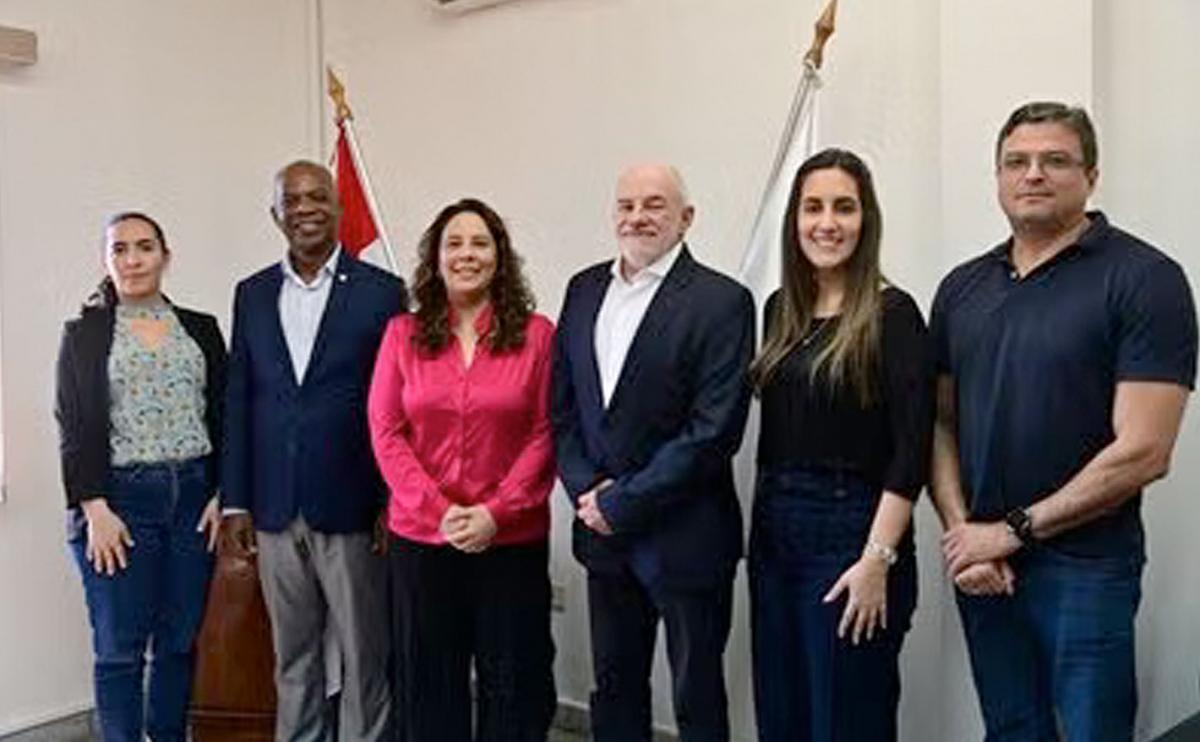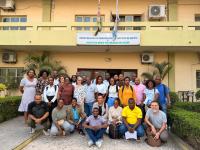Keynote lectures on Health in All Policies and One Health are being given with support from PAHO in Paraguay
Asunción, September 2, 2025. Within the framework of the First National Congress on Public Health "Health in All Policies," organized by the Faculty of Medicine of the National University of Asunción with the support of the Pan American Health Organization (PAHO), Drs. Rômulo Paes de Sousa, researcher and professor, and Marcos Boulos, renowned Brazilian infectious disease specialist, were in the country. They offered keynote lectures on "Health in All Policies" and the concept of One Health, respectively. Dr. Paes de Sousa also paid a courtesy visit to the National Institute of Health (INS), where he exchanged experiences and analyzed current challenges in research and training of health professionals in Paraguay.
The keynote address, "Health in All Policies: Utopia or Political Necessity?", was presented by Dr. Rômulo Paes de Sousa, a physician with a PhD in epidemiology from the London School of Hygiene and Tropical Medicine, president of the Brazilian Public Health Association (ABRASCO), and senior researcher at the Center for Strategic Studies at Fiocruz.
Dr. Romulo Paes de Sousa emphasized that Health in All Policies is a fundamental political necessity to achieve an equitable impact on population health. He emphasized that this approach requires cross-cutting integration and a holistic view of health, recognizing its impact on social, economic, and environmental factors far beyond the health sector. He also underscored the imperative to act at all levels of government—local, regional, and national—to effectively articulate a multisectoral commitment that aligns public policies with the well-being of the population. Finally, he emphasized that this comprehensive strategy is essential for building more resilient, sustainable, and truly people-centered health systems in the long term.

During his visit to the National Institute of Health, Dr. Paes de Sousa was welcomed by the director, Dr. Cristina Caballero, and her technical team. During the meeting, the strategic collaboration between Fiocruz and the National Institute of Health (INS), aimed at strengthening public health in Paraguay, was strengthened, with a special emphasis on technical cooperation for research and the training of health personnel. This joint effort, supported by PAHO, seeks to improve the quality of life of the Paraguayan population and promote significant advances in public health.
One Health as an interdisciplinary perspective
Dr. Marcos Boulos, senior professor at the University of São Paulo School of Medicine and technical consultant for the national malaria program, gave a keynote address on the comprehensive One Health approach. In front of an audience composed of students, professionals, and researchers, he explained that One Health is a holistic approach that addresses health threats at the interface between humans, animals, and the environment. He highlighted the importance of this interdisciplinary perspective in addressing emerging diseases and zoonoses, strengthening resilient and sustainable health systems for the collective protection of public health.
“The spread of potentially pandemic pathogens is a result of livestock farming, hunting, and the wildlife trade, land-use change—particularly the destruction of tropical forests—the expansion of agricultural land—particularly near human settlements—and rapid and unplanned urbanization. Climate change is also shrinking habitats and displacing terrestrial and marine animals to new locations, creating opportunities for pathogens to reach new hosts,” explained Dr. Boulos.
The professional recalled that, throughout history, humanity has repeatedly faced pandemics and epidemics, events that have affected the world's social, economic, and demographic fabric:
- Black Death (1346-1356) – killed 1/3 of Europeans
- Cholera – from 1817
- Tuberculosis – more than a billion deaths between 1850 and 1950
- Smallpox – between 300 and 500 million deaths in the 20th century
- Malaria – 3 million deaths per year since 1980
- AIDS – 22 million deaths since 1981
- Spanish Flu (1918-1919) – ¼ of the world's population affected
- Covid-19 - the most impactful pandemic of this century
Finally, Dr. Boulos emphasized that, to address health challenges with a One Health approach, it is crucial to implement key actions such as reducing risk and controlling zoonoses through epidemiological, virological, and genomic surveillance, supported by laboratory diagnostics. Furthermore, intersectoral coordination must be promoted, food safety strengthened, hospital-acquired infections reduced, and the environment integrated as a fundamental pillar in all policies, recognizing the inseparable link between human, animal, and environmental health.
This series of conferences and meetings is part of a joint effort between PAHO, national institutions, and academics to consolidate a comprehensive, participatory, and people-centered public health model in Paraguay.



